Sonos Move review
If you know the answer to ‘What is Sonos?,’ you know you’ve been stuck listening to Sonos speakers inside. Not only does the Sonos Move, the first portable Sonos device, pack expected Sonos-quality sound, but its built-in battery makes it one of the best smart speakers for indoor-outdoor use we’ve seen.
It also has Google Assistant and Alexa, making it a useful companion for voice-operated smart-home control, plus IP56 water resistance. So it’s one of the best waterproof speakers as well — not bad for a first try.
Sonos’s second portable speaker, the $169 Sonos Roam, is more waterproof though. See our Sonos Roam vs. Sonos Move face-off for all the differences between the two speakers.
The Sonos Move ($399) sports a new Sonos technology called Auto TruePlay, which uses microphones to automatically tune the speaker for its surroundings. Bluetooth control and 11 hours of battery life (thanks to a recent software update) make it a worthy portable version of the stellar Sonos One, and one of the best Bluetooth speakers with premium audio. But with that, it comes at a premium price.
Sonos Move price and availability
The Sonos Move costs $399.99 is available to purchase as of this writing. It originally launched in a single, Shadow Black finish, but Sonos has since added a Lunar White option with UV protection. In other words, it shouldn’t yellow in the sun.
Sonos Move review: Design
When compared with the Sonos One, the Sonos Move is the cooler cousin. Its matte almost-black finish and grille combination is stylish enough for a modern space without hiding its purpose. It’s tall, broad and oval in shape. It’s a true progression from the classic Sonos design.
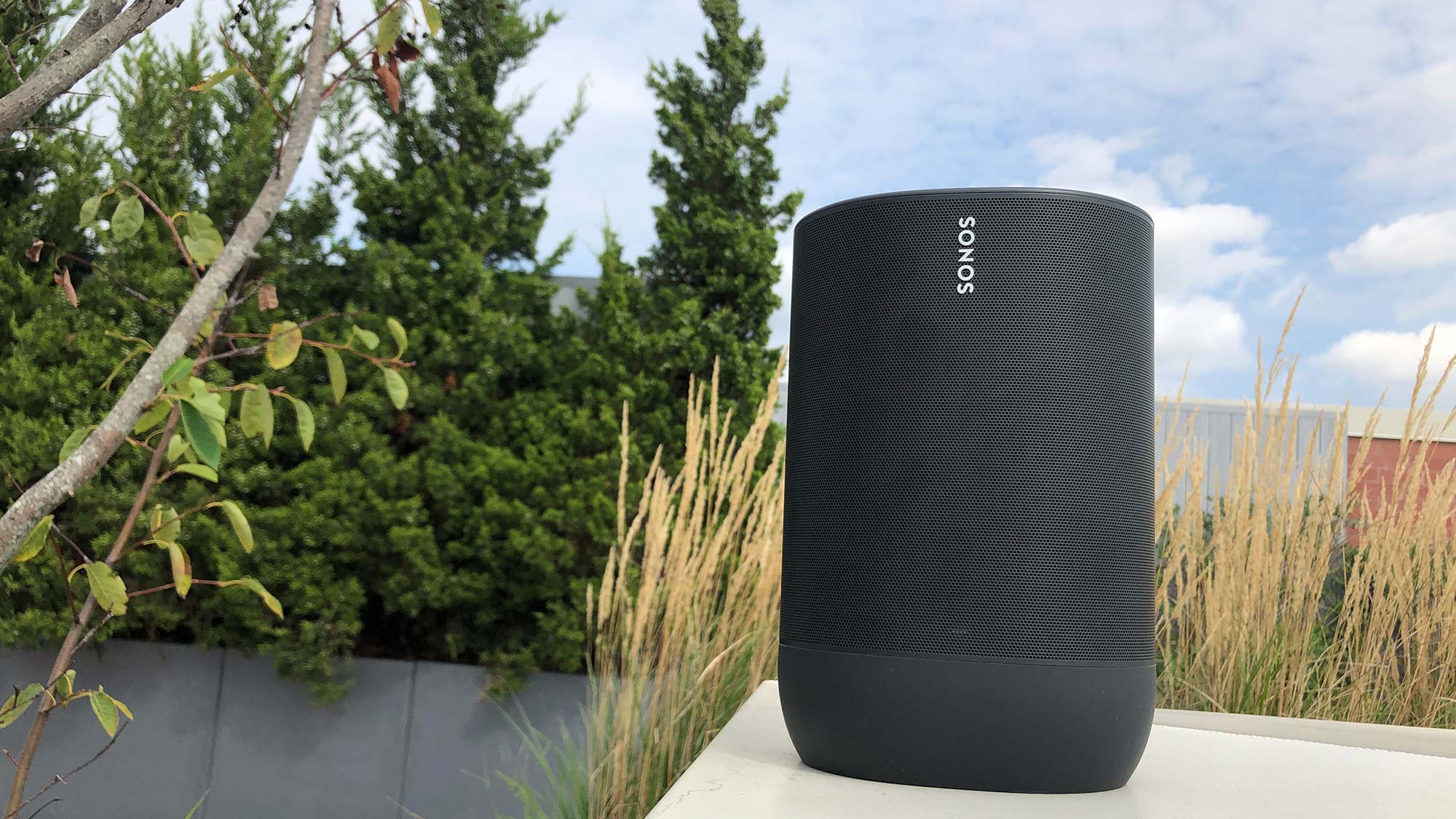
I docked the Move on my white marble kitchen island, where it fielded attention with grace. My Sonos One, by comparison, is camouflaged with the rest of my home entertainment device on my TV stand.
A respectable two-thirds of the Move’s exterior holds the speaker grille, while the back panel features a up-facing claw-grip handle. Also on the back is the power button, a button that lets you switch from Wi-Fi to Bluetooth, and a button for connecting the Move to other Sonos speakers in your sound system.
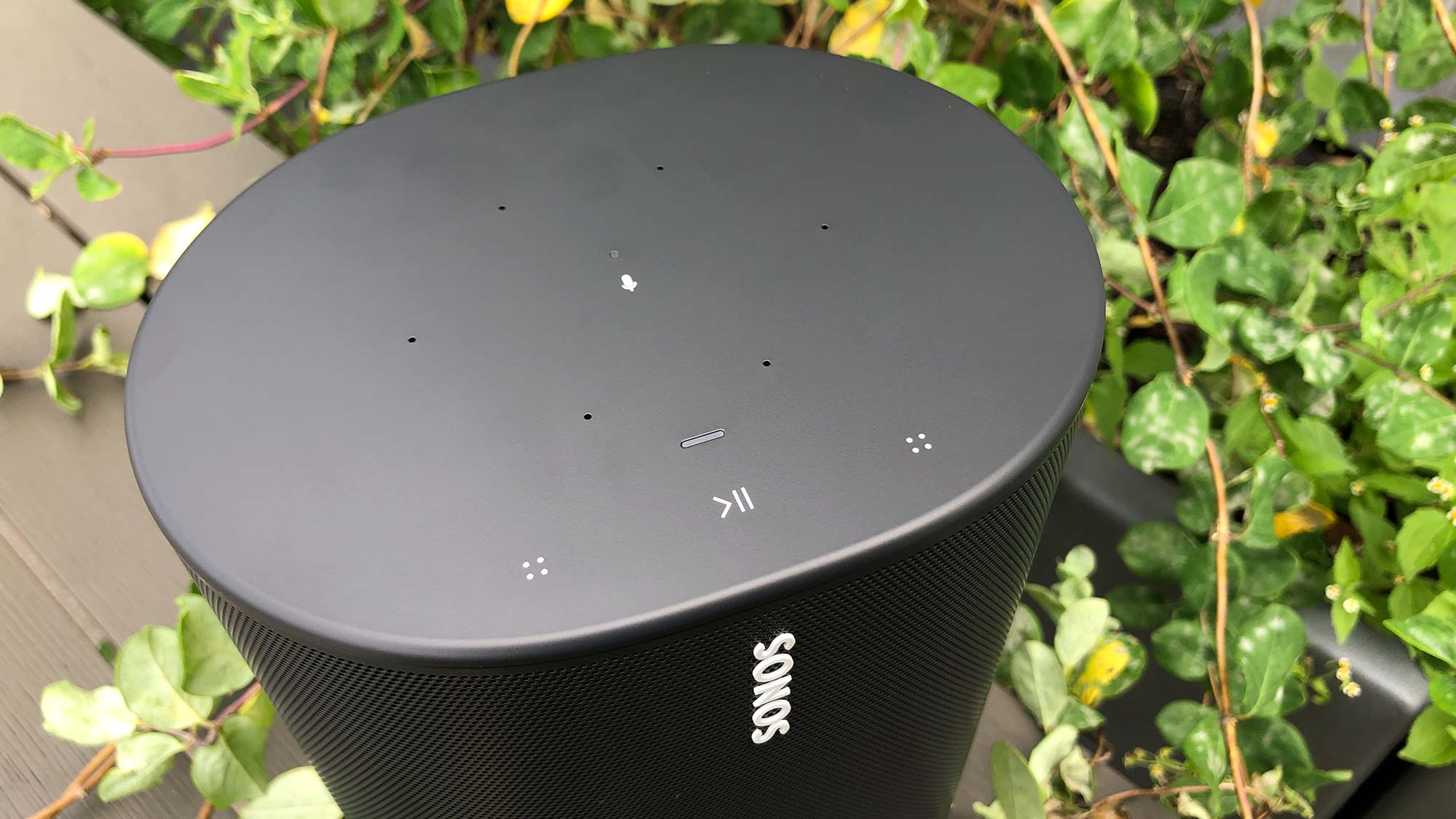
The top has volume, pause and play controls, as well as two status lights: one indicating when the speaker is on and another when the Move’s four-microphone setup is listening.
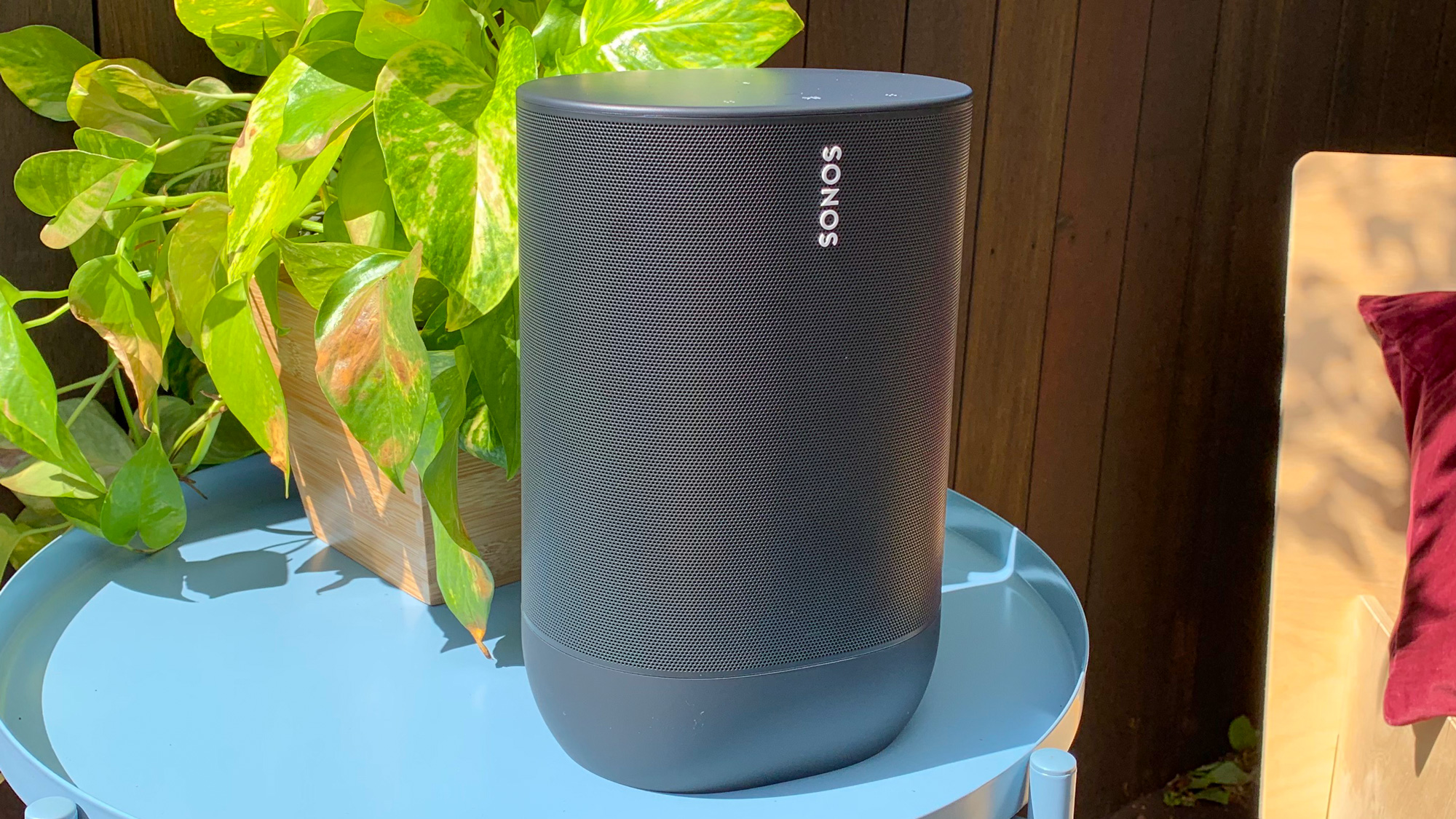
When compared with the Sonos One, the Sonos Move is the cooler cousin.
Size and weight are the Move’s glaring design setback. With more than 6 pounds packed into its 10-inch tall body, it’s a dense device. It’s unpleasant to carry the Move while trying to hold anything else. Even the trip up to my apartment’s rooftop with the Move in one hand and a coffee mug in the other felt awkward. Transporting the Move anywhere a few minutes away is a two-handed job.
So schlepping this thing to the beach might be unrealistic — check out our list of the best Bluetooth speakers for more portable options — but moving around different parts of a home or outside to the backyard are more plausible.
Sonos Move review: Audio performance
When it comes to engineering speakers, Sonos has a stellar track record. The Move offers a melodic listening experience with its tweeter, woofer and two amplifiers. Depending on your preference, the speaker can provide subtle background noise, booming dance bass and everything in between. Even at its loudest, the Sonos Move sounded balanced thumping out Billie Eilish’s “Bad Guy.”
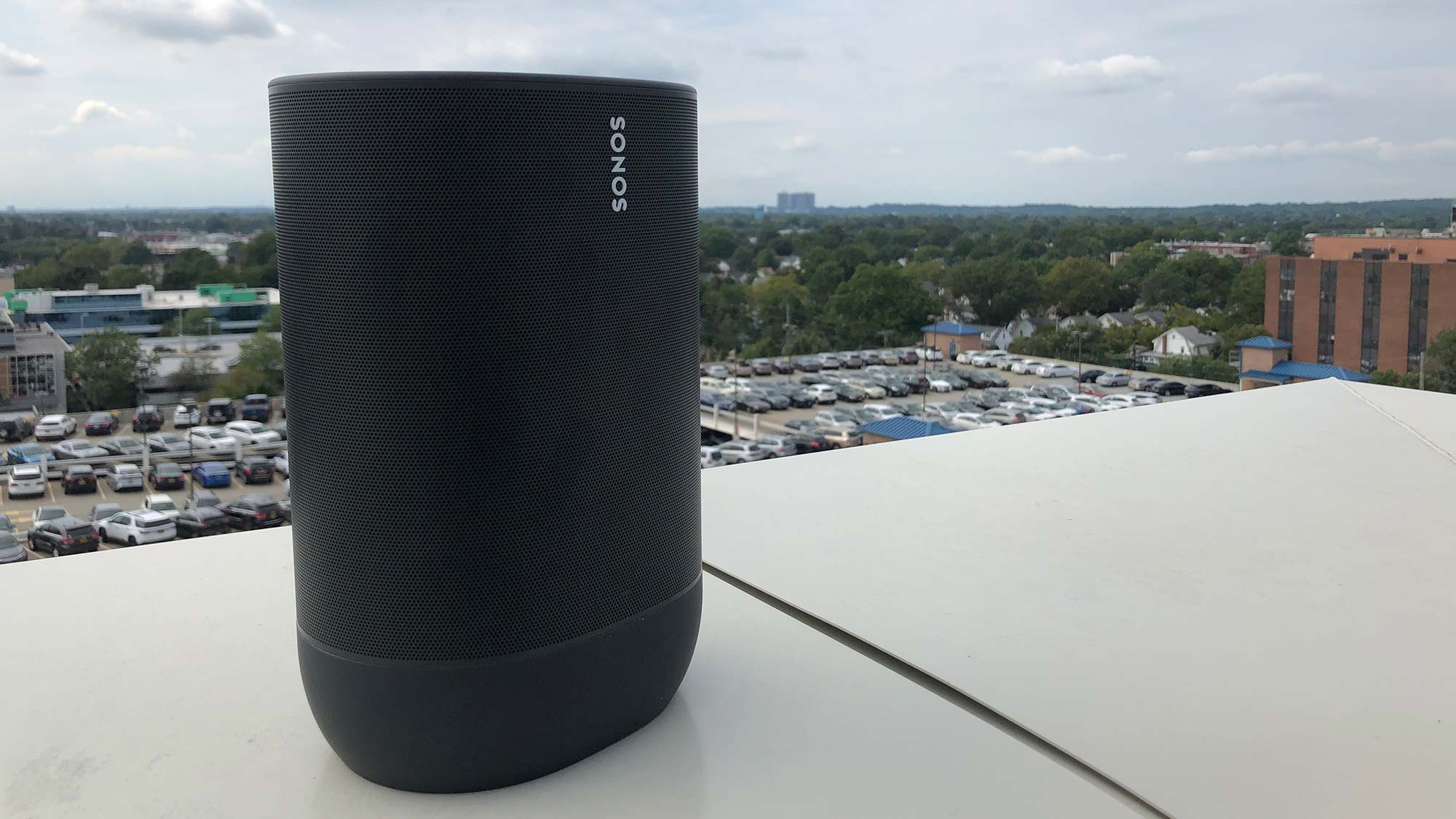
The speaker can provide subtle background noise, booming dance bass and everything in between.
On the rooftop of my block-long apartment building, the Move’s music filled the elevated open air. At full volume, neighbors on the opposite side of the patio came over to inquire about the party. What they found was me, alone, playing Spotify’s “Dance Hits” radio through an incredibly powerful speaker.
As for listening options, the Sonos Move offers 100 streaming services controlled from the Sonos app, using voice, or with Apple AirPlay 2. But only when the device is connected to your Wi-Fi. Once you switch to Bluetooth, you can play audio direct only from music service apps like Spotify and Pandora.
Note that you can’t use the Move as a soundbar — yes, we’ve been asked this before. For more information on Sonos soundbars, see our Sonos Arc review and Sonos Beam (Gen 2) review.
Sonos Move review: Auto TruePlay
If you have a Sonos speaker, you may have used TruePlay via your smartphone to synchronize the device for the space it sits in. The Move replaces that manual configuration with Auto TruePlay, a new technology from Sonos that lets the speaker automatically tune itself through built-in microphones. Sonos says it’s not as precise as the traditional manual setup with its other speakers, but it’s a lot more convenient.
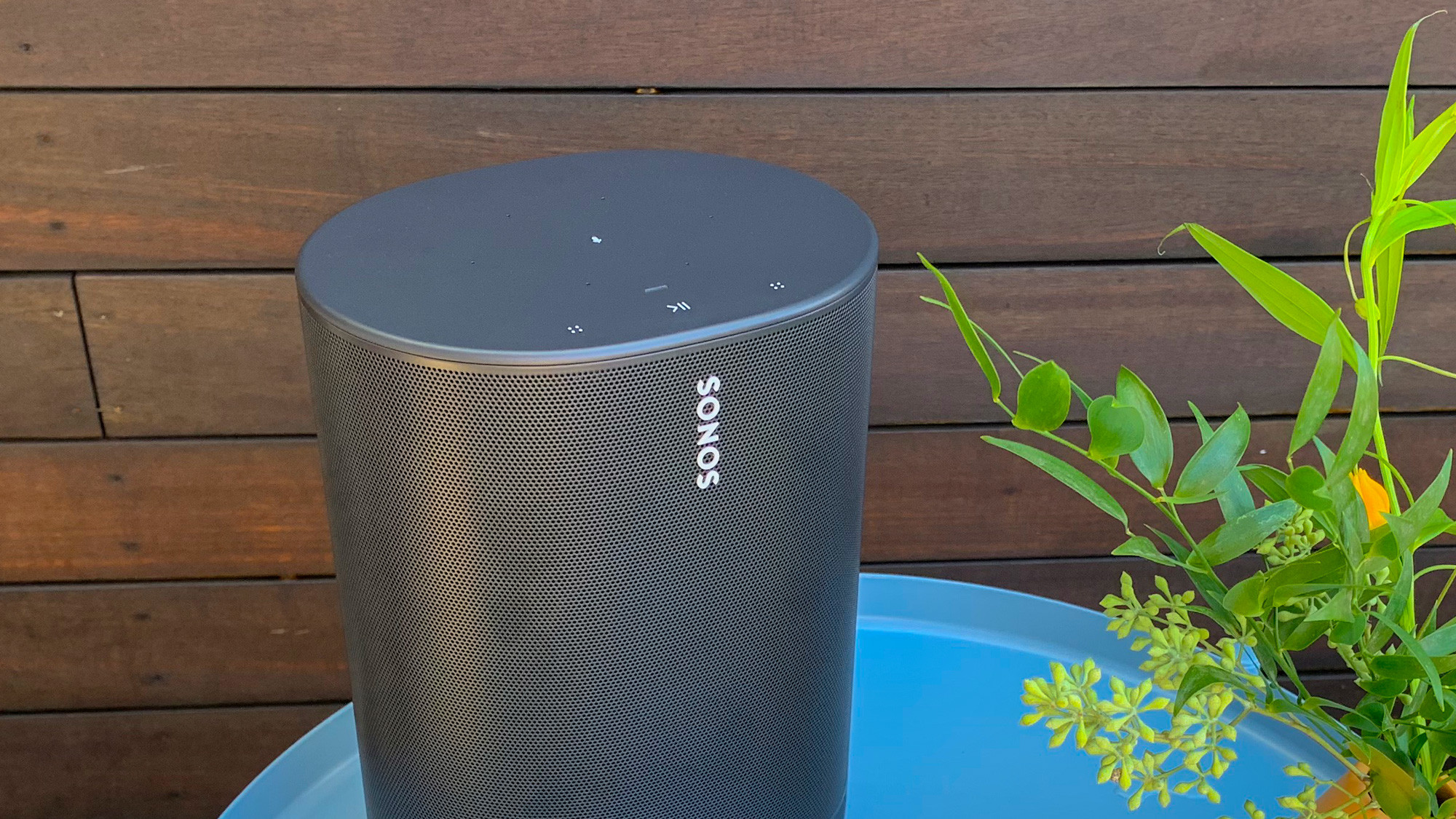
Not all outdoor spaces have the same acoustics, so Auto TruePlay is supposed to adjust sound settings to best fit your surroundings. Whether you’re at a packed backyard party, an open-aired beachfront or a tiny balcony, the Sonos Move should deliver a balanced audio experience.
I put Auto TruePlay to the test in a few indoor locales and noticed subtle changes. I undocked the Move from my counter and put in an open bedroom shelf, where it slightly decreased the bass in Zedd’s “Clarity” to subdue the echo. When I left the room and shut the door behind me, I hardly heard the electronic anthem at medium volume, which I’m sure my apartment mates appreciated.
Outside is where Auto TruePlay shines. On my apartment’s rooftop patio, the Move’s audio sounded flawless. It drowned out the sound of traffic and trains below, but didn’t impede on that face-to-face conversation I had with my neighbors. I never want to manually calibrate a speaker again after using the Move, and I hope Auto TruePlay is in all Sonos speakers going forward.
Sonos Move review: Outdoor use
Most smart speakers need Wi-Fi to work, so they become less than useful once you’re outside the range of a network. Sonos solved this quandary by installing a switch in the Move that lets users choose whether they’d like the operate the speaker over a Wi-Fi or Bluetooth connection. Pressing the button overrides the standard Wi-Fi control so that users may pair their smartphone to the Move.
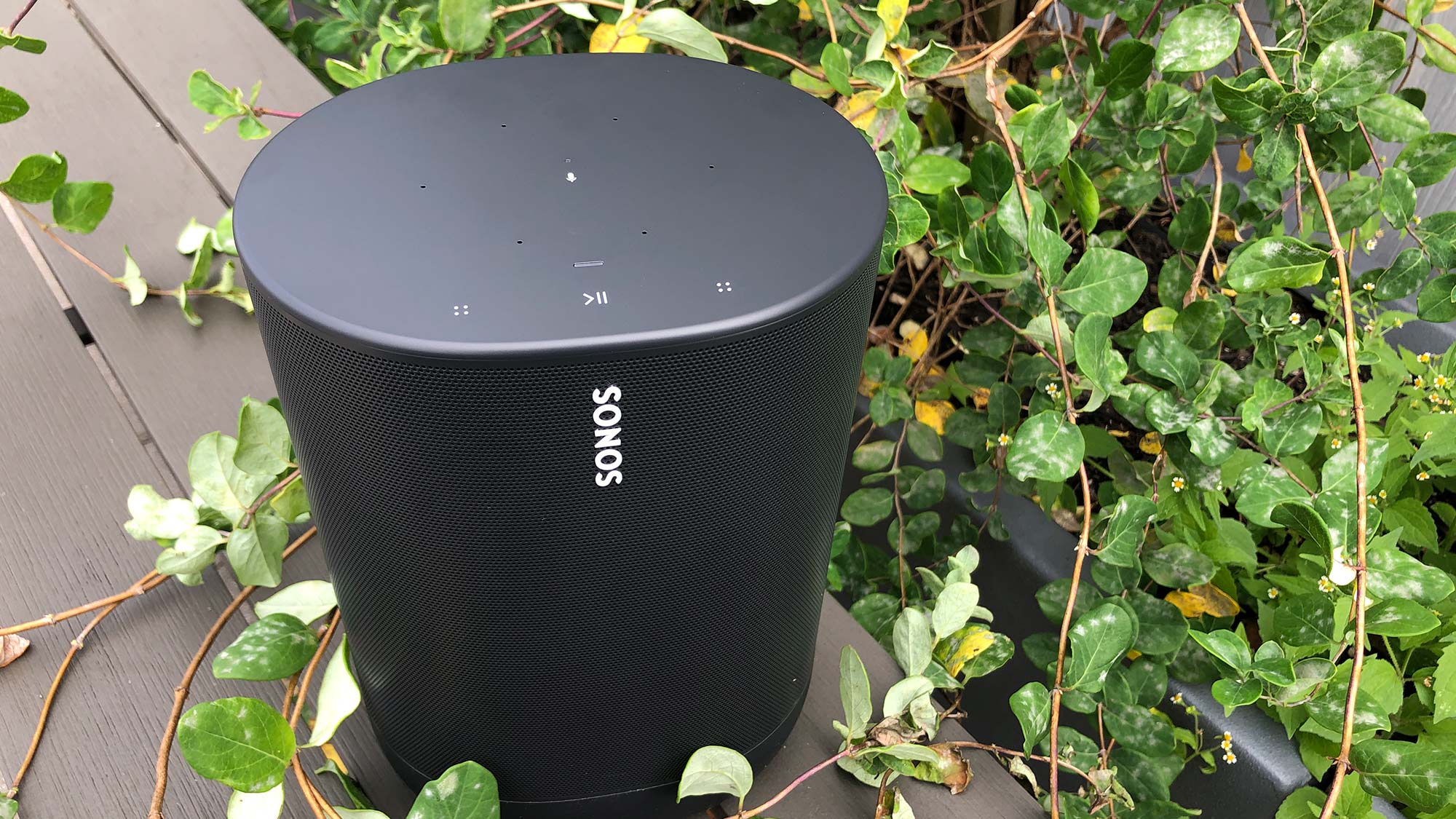
But once you’re on Bluetooth mode, you’re no longer using a smart speaker. Aside from its Sonos-quality sound, it’s the same as any other portable speaker. Alexa and Google Assistant are checked at your home Wi-Fi’s door, and the Sonos app is rendered useless. You can’t even pair two different devices to it for multiple DJs.
The Move’s movement has limits, and I think it’s as far as your Wi-Fi reaches. Move it to your backyard, patio or porch –– pretty much anywhere where you’ll still get the comprehensive Sonos library and can make voice commands.
Sonos Move review: Amazon Alexa and Google Assistant
The Sonos Move packs two popular virtual assistants: Amazon Alexa and Google Assistant. Setting up both (you can’t use them simultaneously) on the Move is simple, and once you enable your assistant of choice, you can ask the Move for things like your local weather, a newscast and your schedule for the day. You can also operate several of your smart-home devices with voice commands if your Move is in range.
On my home Wi-Fi network, the Move responded to a number of the best Google Assistant skills requests without hesitation. I switched playlists, found out current traffic conditions before I left for dinner, and turned off my living room’s smart light bulbs using my voice.
However, there are some limitations when compared to smart speakers made by Amazon. For instance, like the Sonos One, the Move doesn’t support calling or the Alexa Drop-In intercom feature. Still, it’s able to use most of the best Alexa skills.
Sonos Move review: Charging and battery life
The Move’s battery life lives up to Sonos promise of 10 hours on a full charge. For this review, I played a variety of genres at different noise levels nonstop from 10 a.m. to 10 p.m. as I went about my day. The battery steadily drained by 10% every hour or so.
The Move also switches to suspend mode when it’s not being used, allowing it to preserve battery life for up to 120 hours, according to Sonos.
When it ran out of juice, I recharged the Move by setting in on the included ring power base. Though it can be charged on-the-go with a compatible USB-C travel charger, too. However, unlike some other portable Bluetooth speakers, you can’t use the Move’s battery to charge other devices.
Sonos Move review: Durability and drop test
With any portable speaker, durability is a must. The great outdoors isn’t always tech-friendly, so you’ll want to know if your device can withstand weather and roughhousing before you bring it out of the house. With an IP56 rating, the Move is dustproof and waterproof enough to withstand coarse sand or a rainy night when forgotten outside.
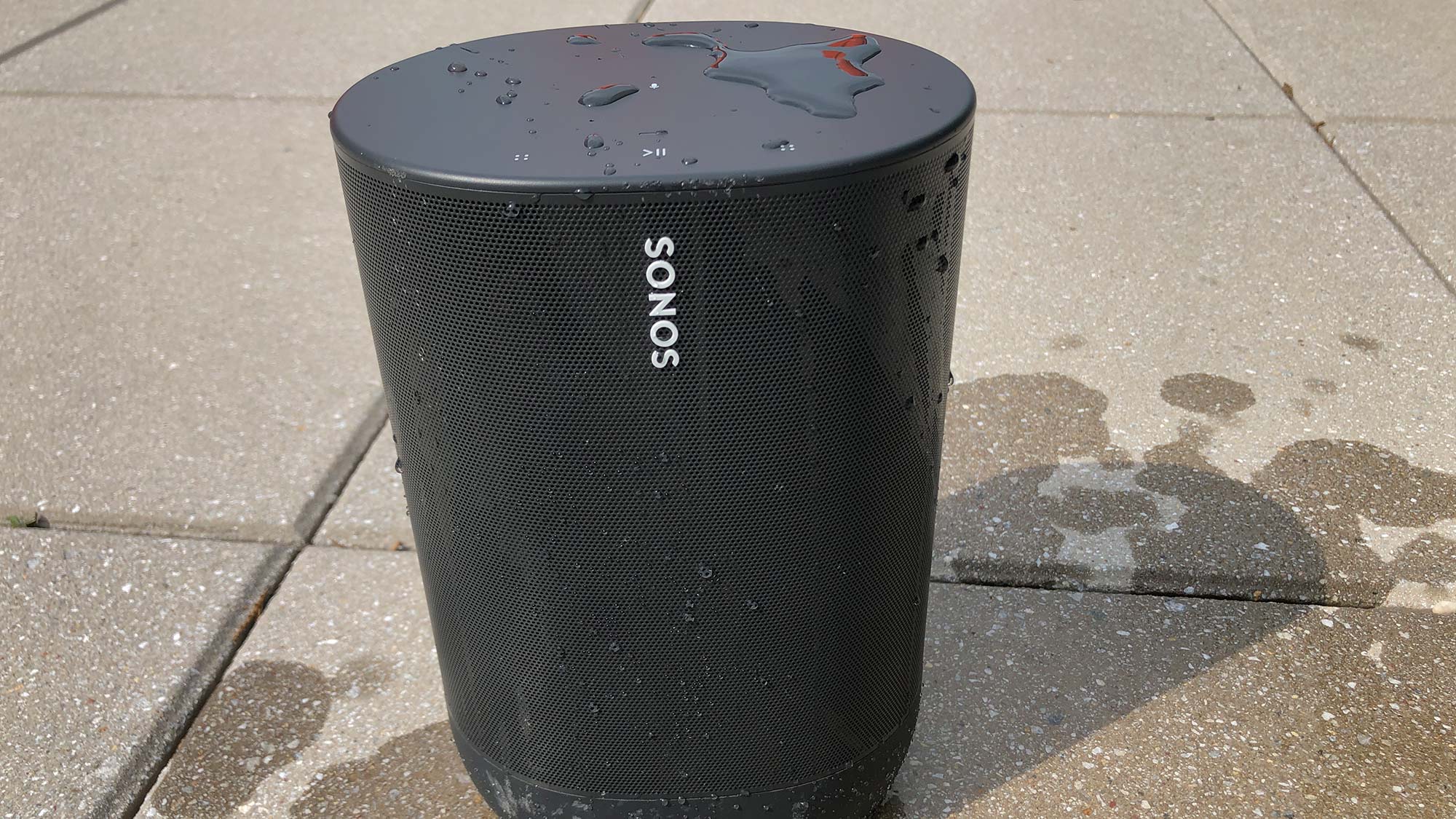
I never want to manually calibrate a speaker again after using the Move, and I hope Auto TruePlay is in all Sonos speakers going forward.
I didn’t want to rough up the Sonos Move too much, but I put it against the elements I face on a regular basis: liquids and slippery fingers. A splash from a water bottle proved harmless to the Move. I wouldn’t leave it too close to the pool’s edge, but it’ll fare fine doused with typical outdoor party beverages and condiments.
With weight being a concern of mine, I wanted to know that the Sonos Move wouldn’t expire with an accidental drop. I let it fall from my hand 3 feet in the air. The sigh of relief I exuded was almost louder than the Move, which, much to my delight, still worked after the concrete collision. It earned some minor exterior battle wounds upon closer inspection, but they weren’t obvious.
If outdoor performance is a concern, then you can also check out our list of best outdoor speakers.
Sonos Move review: Value
If you’re shopping for smart speakers with an open mind, you might not want to invest $399 before knowing how it could integrate into your smart home. Although we haven’t tested it yet, the Bose Portable Home Speaker also has Alexa and Google Assistant, but costs $50 less and is about a third of the weight.
And the stationary Sonos One will set you back just $179. In other words, you could get two Sonos One speakers (a popular surround-sound entertainment setup) for the price of the Sonos Move.
But the Sonos One can’t accompany you outdoors. If you spend a good chunk of your time home in your backyard, you might want to opt for a speaker you can carry around.
Sonos Move review: Verdict
The Sonos Move is a solid smart speaker, but I would call it a wireless smart speaker before calling it a portable one. Being able to transport it around the home and immediate outdoor spaces is useful, but its weight and lack of smarts on Bluetooth mode would discourage me from packing it for a day trip.
Still, there is a best portable smart speaker title to be earned, and the Sonos Move makes a convincing argument with its exceptional audio quality and Auto TruePlay tuning. It’s up against the bucket-handled Bose Portable Home Speaker ($349), which also has built-in support for Alexa and Google Assistant. The stationary Sonos One is still a better option as an in-house smart speaker, but the Move adds a long-demanded dynamic alternative to the Sonos lineup.
For all the latest Technology News Click Here
For the latest news and updates, follow us on Google News.
